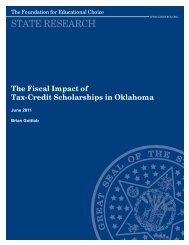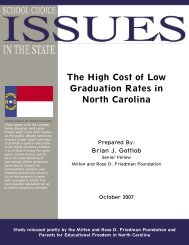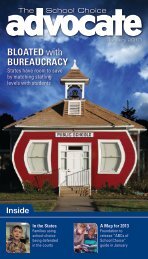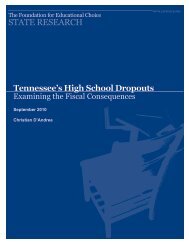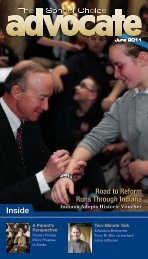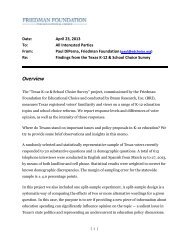Survey Memo - The Friedman Foundation For Educational Choice
Survey Memo - The Friedman Foundation For Educational Choice
Survey Memo - The Friedman Foundation For Educational Choice
You also want an ePaper? Increase the reach of your titles
YUMPU automatically turns print PDFs into web optimized ePapers that Google loves.
However, there may be opportunity to grow support for “virtual schools.”<br />
Approximately 30% of voters say they are familiar with “virtual schools.” <strong>The</strong><br />
association between virtual school familiarity and favorability is positive in<br />
direction and moderate in size (r=.370, p < .01).<br />
Likewise, the same can be suggested for educating and building support for<br />
“online schools.” <strong>The</strong> same proportion of voters say they are familiar with online<br />
schools. <strong>The</strong> association between online school familiarity and favorability is<br />
positive in direction and moderate in size (r=.283, p < .01).<br />
Tennesseans clearly support “tax-credit scholarships.” <strong>The</strong><br />
percentage of those who favor (61% or 69%, depending on the<br />
question version) is more than double the number of people who say<br />
they oppose the policy (26% and 20%). No matter the wording of the<br />
question, we measure very positive reactions (+35 net and +49 net).<br />
See Questions 13A and 13B<br />
Based on our split-sample experiment results, it appears adding definition and<br />
context for voters will likely boost support for tax-credit scholarships (by eight<br />
percentage points, from 61% to 69%). <strong>The</strong> additional wording in question 13B<br />
also affects some demographic groups, such as Republicans (67% to 80% favor)<br />
and middle-age voters (58% to 82% favor). No matter the extra wording, older<br />
voters are more negative than other demographic groups – nearly three of ten say<br />
they are opposed to tax-credit scholarships.<br />
<strong>The</strong>re is majority support across all examined demographic groups. That said, a<br />
stark difference emerges among generations of voters. Almost three-fourths of<br />
younger and middle-age voters (73%) support tax-credit scholarships, compared<br />
with a substantially lower proportion of older voters (55%).<br />
Tennessee voters support an “education savings account” system<br />
(called an “ESA”). <strong>The</strong> percentage of those who favor ESAs (56%) is<br />
[ 9 ]



